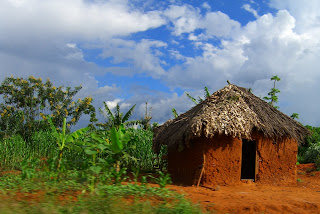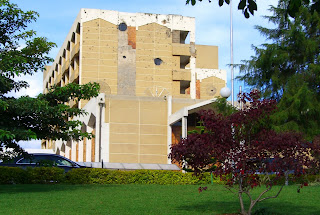Unfortunately, SLEEP DEPREVIATION has been the theme of our first week in the Partner’s In Health (PIH) house. Part of the problem is simply getting use to a new place. Our bed felt uncomfortable for the first few nights and our room is crowded with our suitcases. Michelle has felt anxious about constantly being on call as she adapts to her new role as the House Manager. In the mornings we frequently hear people stirring in the house by 7am. Once someone is up, she feels compelled to be present in order to meet guests and have a chance to introduce herself.
The other problems contributing to our sleepless nights are mosquitoes and heat. In our previous house, there were screens on the windows so we could leave the windows open at night to take advantage of the cool air. The windows in this house have no screens. We decided to take a chance and sleep with the windows open but the tradeoff was worse. We were devoured by mosquitoes all night! Even with a mosquito net, we were eaten alive. Our arms, legs, necks, and hands were covered in small red bites. The next morning we woke to find at least 5 mosquitoes hanging out inside our net. Quite the cozy family, huh?! The itching and scratching is one thing, but that mosquito “buzzzzz” triggers an involuntary response to stay awake until the predator is killed.
After too many consecutive sleepless nights, Nate now sleeps with a flashlight under his pillow as his defense. Our plan of attack is to stand up in our tent, in the middle of the night, once the soul piercing buzz begins and start our killing spree so we can fall back asleep. At first it didn’t seem worth the effort. But now we know we won’t get any sleep while our arch nemesis is near. Isn’t it amazing how powerful our human instincts are?
The fun part of Michelle’s job as been meeting all the PIH staff. In fact, in two days there will be a big house party in honor of two recent engagements. Peter, the country director proposed to his girlfriend, Neo, back in Boston just two weeks ago and Gene proposed to his girlfriend, Sheida, on top of Mount Kilimanjaro earlier this month. Staff from all PIH sites in Rwanda (Rwinkwavu, Kirehe, and Butaro) will come to Kigali for the celebration. Now we get to meet everyone in one fell swoop. The expected turn out is somewhere between 60 and 80 people! We are in for a fun time.
The not so fun part of Michelle’s job is trying to make improvements in the house without having much authority. Her initial assessment of the house revealed many problems areas that need to be addressed. Admittedly we were surprised by the number of things broken or expired given the fact that the house is used on a regular basis. For example, out of the five bathrooms, only two toilets are in working order, one sink leaks on the floor, and others are clogged and won’t drain properly. Up until now there has been no trash service so the MO has been to throw everything in the broken fountain outside in the backyard. There are walls crumbling down due to water damage. Every room had 75% of the light bulbs burned out. 80% of the mosquito nets have holes and are dirty, not to mention some beds not having mosquito nets at all. After our first week of sleepless nights, we know how unacceptable this is for the comfort of our guests. There is also a shortage of towels and pillows which makes for an uncomfortable stay when the house is full.
On the one hand, these seem like easy fixes. Being the optimist that Michelle is, she felt great about sending her report the first day with an execution plan in place for addressing the most urgent needs before the house is bursting with 80 people. Little did she know the reality of having to rely on other people to execute solutions while working in an inefficient culture makes these tasks impossible to complete in one week. It has been quite the emotional rollercoaster this week. We are two days away from the party and the plumber who was “suppose” to be here on Tuesday still hasn’t shown up. Even though Michelle is in charge of the house, she doesn’t have the freedom to pay for utilities with petty cash or the jurisdiction to call the service people to come fix things in the house. The procedures in place require her to go through the chain of command in the office. As of now, her bosses have been preoccupied with other things so their response time has been slow.
The other challenge Michelle is facing is figuring out boundaries between her home and her workplace. Even though the job description said 10-15 hours of work a week, the reality is it is a 7 day a week job given her role of overseeing the house staff that work every day and being the go to person for the guests. Funny how she finds herself in another job that has blurred boundaries. Coincidence much?!
All in all, she is still very excited about her job and is energized by all the possibilities for improvements. PIH is doing some incredible things in the health sector of Rwanda and around the world. It has been a treat to hear about these stories first hand and to get to know some wonderful people in the process. We sense the comfort of being adopted into an established community but we do miss our friend Esron. In a lot of ways, we feel like we are faced with the task of settling in all over again. Once again, our common ground from the many moves we have made in the past 6 months has been each other. For this we are grateful!
Imana ibarinde kandi ibahe umugisha















